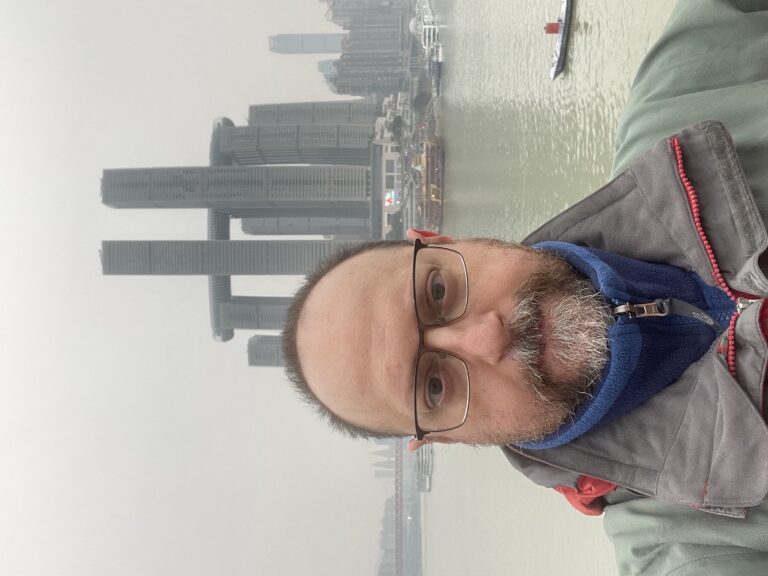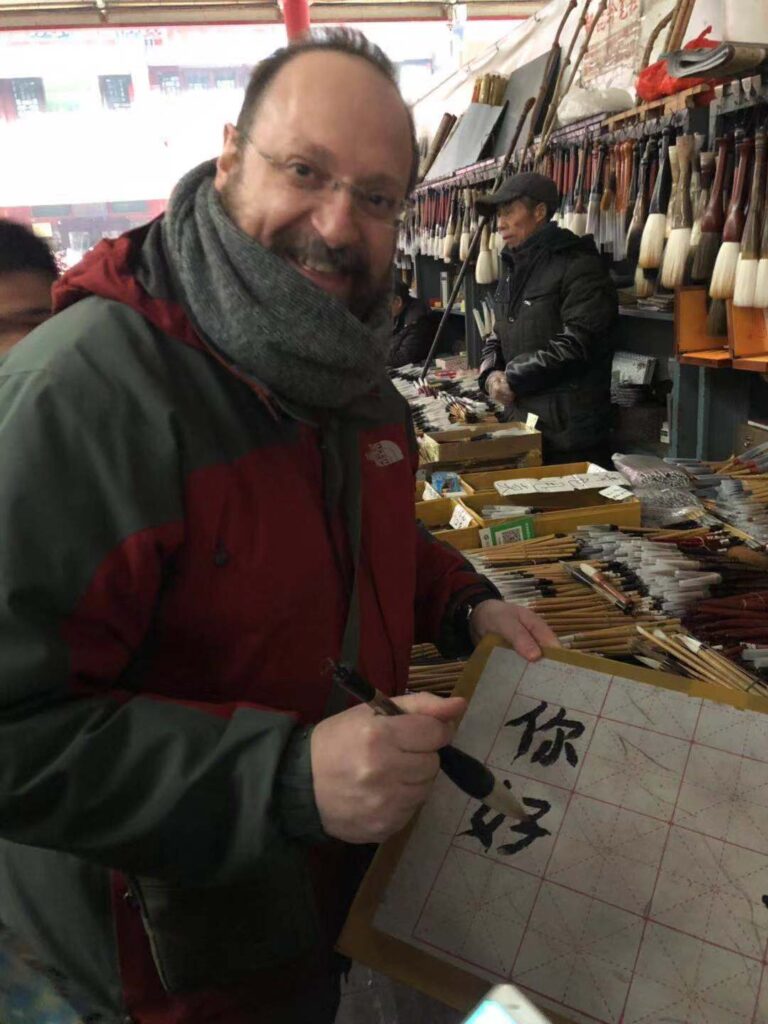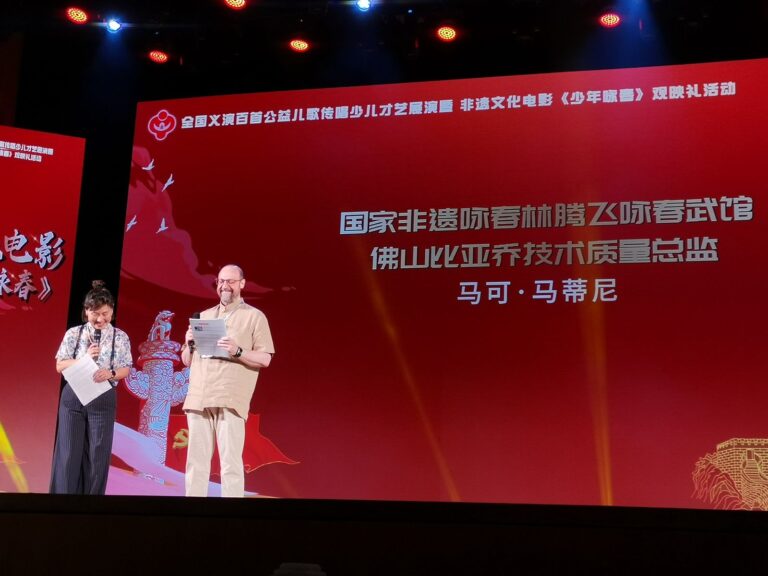
Galilei Circle of Friends – Interview with Marco Martini

Marco Martini is Head of Quality and Technical Documentation of the company “Piaggio China”. His offices are in Foshan, Guangdong, where he is responsible for quality, homologation and technical documentation. Between his many tasks inside the company, he also helps the company to design new strategies of Piaggio Group in the growing China Market, reshape the quality and technical team organization, to respond to the needs of the local business unit.
We are extremely glad to bring his story to our column. Over the years mister Martini has a built special relationships with the city of Chongqing, where he has traveled many times and has had different business and personal experiences. During his long lasting experience in China, he has witnessed a profound and disruptive change, appreciating China innovation but also coping with many challenges and difficulties. His “love at first sight” with China millennial culture and civilization has brought him into a new world, where he has been continuously able to adapt to appreciate the speed of change in the biggest market of the globe.

PERSONAL RELATIONSHIP WITH CHINA
How did your experience with China begin? Was it by chance, work-related, or for pleasure?
My adventure, and it is no exaggeration to call it that, began in June 2006, thanks to a scholarship from the University of Pisa, promoted by ICE and CRUI, with the support of some important Italian companies, including Piaggio. I applied for the scholarship by pure chance, only at the insistence of a dear friend. I would have never thought of applying, let alone imagined winning one of the spots. Life, however, sometimes takes unexpected paths and surprises you: I passed the selection and found myself with a ticket to Nanjing. Initially, it was supposed to be just 2 months, but as time went on, it turned into 4… The following year, in April, I was already hired by Piaggio, residing near one of our important partners in Chongqing, as a Quality Inspector. From there, I never distanced myself from Asia.
How has your relationship with China evolved over time?
At the beginning, it was love at first sight. I was immediately stunned by the modernity of a world I expected to be completely different and, at the same time, captivated by the echoes of a profound millennia-old culture. While China evolved at an incredible speed, changing day by day, I, too, had the fortune of enriching my human and professional experience in a similarly rapid manner. It would have been unthinkable to gain such hands-on experience elsewhere in the same span of time. In short, I can say that the rapid development of China has influenced and fueled my professional career and human experience. Describing it as a symbiotic evolution sounds pretentious, and I feel a bit embarrassed by the disparity of power relations, but I believe it conveys the idea well.
What has your personal experience in this splendid country taught you?
A question that would require a whole book to provide a fully satisfying answer. I don’t exclude writing it someday. If I were to summarize what I personally gained from this extraordinary country, one thing stands out above all: everything can be difficult, but nothing is impossible.

BUSINESS – The experience with Piaggio
How has China changed compared to its early years from a business perspective in your specific sector?
Piaggio has been present in China since the early 1990s when the company was still under Fiat ownership. The changes have been considerable. In the beginning, Piaggio’s experience in China faced ups and downs until the turning point in the early 2000s, just before my arrival at the company, following a bold relaunch action by the management led by Colaninno. With the revitalization of our joint venture in Foshan and the initiation of significant global sourcing activities, Piaggio has developed an extensive supplier network and laid the foundation for establishing a commercial network for the sale of its vehicles, including imports. The Chinese market, like many Western companies, has always been a challenging target to conquer, difficult to understand, and challenging to penetrate. However, today we are finally present and active both in the industrial sector and in sales of our vehicles produced in Italy and Vietnam. In the early years, the competition from local competitors hindered effective competition in the low-cost product segment. However, over time, the rise of the middle class has allowed the growth of a market segment that values style, high-end performance, and excellence. This has enabled our premium products such as Vespa, Aprilia, and Moto Guzzi motorcycles to be appreciated and widely adopted. Now we consider China an interesting and important market, not only for supplying components and opportunities for industrial cooperation but also for imports.
What are the differences that have struck you the most positively and negatively?
Certainly, the evolution of society and the widespread growth in prosperity and purchasing power of the Chinese population have been a strong positive factor in the growth of the global market and new business opportunities. On the negative side, the cooling of international relations and the increasing Western suspicion towards China’s renewed assertiveness are certainly not positive developments. We hope for a reversal of this trend as cooperation remains advantageous for everyone.
Can you tell us about your experience at Piaggio? What was your role, and what are the main results you achieved over the years?
My first assignment at Piaggio was to oversee the industrialization of an engine with one of our partners in Nanjing, a motorcycle manufacturer belonging to the AVIC group. From that experience, I continued to work in quality control, manufacturing, component industrialization, and projects with our Chinese supplier companies. One of the most important projects I worked on in China was the industrialization of parts for the new commercial vehicle Piaggio Porter NP6, born from collaboration with the Foton Group. Currently, I head the Quality and Technical Documentation function for the China region.
How important is knowing the local culture and language in your business?
Let’s clarify an essential point: the ability to speak the language does not necessarily mean understanding each other. To know and, above all, appreciate the culture and common sentiment of a population and penetrate the cultural barrier that separates us requires more than just language skills. Speaking a language is a technical matter that undeniably helps in work, but there are translators for that. It took me years before I could say “谢谢” (thank you) reasonably correctly, but that didn’t hinder my work; it just made it a bit more complicated, yet also more interesting. For the relational and negotiation aspects, instead of being fluent in Chinese, I found it much more useful to have some historical and literary knowledge about ancient and contemporary China, greatly appreciate the local cuisine and name some typical dishes, or be able to say a few characteristic phrases, especially in the local dialect. For example, speaking of Chongqing, often a simple “要得不?” (Is that alright?) – a typical local interjection – was enough to break tension and establish rapport. However, do not misunderstand me, for a deep understanding of China, absolute mastery of Mandarin Chinese is indispensable, and perhaps Cantonese would be useful as well, but I don’t think that was the point of the question.
Have you noticed any changes in recent years compared to when you first arrived, from a work perspective?
Definitely! Changes have been so significant that they are sometimes difficult to comprehend and adapt to, leading us to manage problems and relationships as we used to do 10-15 years ago, without fully considering the transformations that have occurred. The level of expertise among technicians and management in Chinese companies has grown exponentially. In the early years, with my university education and knowledge inherited within the company, I felt I had competencies far above the average of my Chinese counterparts. However, now I often find myself interacting with young managers with Ph.D. and MBA degrees who have studied at the best international universities. While there are still sectors with low technological levels, they are becoming a minority and of little interest to our business. Western companies, through the work of expatriates, willingly or unwillingly, have contributed significantly to the growth of Chinese companies. Additionally, China’s educational system, with the opportunity for many talented students to study and improve their skills abroad, has significantly narrowed the knowledge and experience gap. Now it’s perhaps time for us to become a bit more humble, learn from them, and embrace the good and innovative practices they are implementing.
How has the pandemic influenced your business, and what strategies have you implemented to respond to the crisis?
The pandemic put a strain on the entire manufacturing industry, especially due to travel restrictions and logistical congestion. Like other companies, we responded by implementing extraordinary measures to promote remote work flexibility, exploring all possible potentials of internet communication, replacing on-site visits with video conferences, and auditing through process documentation via videos, and so on. Being able to maintain a presence in China, myself included, throughout the duration of the Dynamic Zero Covid policy implemented by the Chinese government, was of significant help. This direct connection with Italy allowed us to manage strategic activities and major projects continuously, minimizing the negative effects of various lockdowns.
What are the differences in the impact of Covid-19 on your business between Italy and China?
While the global sourcing and logistics chain of our manufacturing plants in Italy suffered heavily from the impact of Covid-19, our business related to the sale of imported vehicles in China did not experience significant setbacks. Similarly, the production of components by our suppliers, although they faced critical moments during various lockdowns, managed to hold up. I believe that this successful outcome was due to our adaptive capacity and response to emergencies, adopting various containment measures such as work flexibility, remote coordination, monitoring, and pressure on suppliers, reorganization, and optimization of the logistics chain. However, we cannot overlook an objective fact: China’s quick initial response to the pandemic within its borders and its subsequent containment management were decisive. Despite causing annoying controls and significant travel restrictions, with intermittent lockdowns for much of 2020 and 2021-2022, China never truly stopped; instead, it drove productive recovery, and the possibility of purchasing vehicles and using them was never interrupted. This situation allowed us to react and keep the business alive.
What were the main challenges you encountered in your successful managerial experience in China? What were the positive surprises?
Among the main challenges in my experience, I certainly include the constant physical and mental commitment that life as an expatriate worker demands. In practice, you never completely disconnect from work: partly due to the time zone constraint and the relationship with Italian colleagues, and partly because, whether you like it or not, you are uprooted from the habits of your previous life, away from loved ones back home. Then there are numerous internal relocations, continuous visits to suppliers, all aspects that make the work experience diverse, rewarding, and never monotonous, but certainly demanding in terms of energy. Finally, there’s the challenge of building a life abroad, which is no small feat and not for everyone. However, this challenge also offers unexpected perspectives and extraordinary opportunities, not only for one’s career but also for personal growth, including the possibility of new international acquaintances and friendships, which surprisingly have become the most valuable assets gained from this life experience.”

GOING EAST – Why does it still make sense for an Italian company to be in China?
Does it still make sense for an Italian company to focus on the Chinese market, and what are the specific opportunities in the region where you operate?
Although I’m not a business expert or an entrepreneur, having spent almost twenty years in Asia, I have some thoughts on the matter. Here are my insights:
The current situation might lead some to believe that China has become an inconvenient or even hostile partner. In my view, this analysis is hasty or superficial, focusing mainly on diplomatic aspects tied to the redefinition of geopolitical dynamics between old and new powers, while neglecting other crucial factors. For example, the economic perspective tells us a different story: China remains one of the world’s major markets, still offering the best quality-to-price ratio for medium to high-tech manufactured goods. It is on the path to becoming an absolute technological powerhouse in cutting-edge sectors such as IT, Space, New Mobility and Electric Vehicles, AI, and much more. On the international stage, it is asserting itself as a promoter of interesting trade and development initiatives among emerging countries, such as BRICS, SCO, and the Road and Belt Initiative.
In my opinion, it would be a mistake not to be present in China and not to engage with this reality. The point, therefore, is not why but how.
So, why does it still make sense for an Italian company to focus on the Chinese market, and what are the opportunities in the region where you operate?
As I’ve mentioned, being in the Chinese market is necessary if one hopes to achieve significant growth. The opportunities are immense, as are the risks.
While in the past, Italian companies’ interests might have been in offshoring, low-cost manufacturing, or supplying luxury goods to the emerging affluent class, today, perspectives have changed. The overall Chinese market has grown in volume and quality, and consumers have evolved in their tastes and purchasing power. As complexity and challenges increase, so do opportunities. In this context, there is room for the “Made in Italy” brand, which thrives on innovation, excellence, and quality.
Regarding my specific industry, we already have a widespread presence in various provinces and cities through our network of dealers. The same can be said for our supply chain. Looking to the future, once we overcome the post-Covid standstill and the tensions caused by the potential decoupling, my area of interest, closely tied to technological development and innovation, may open up possibilities for technical collaborations with local companies to create new and innovative products. We could develop fresh ideas to meet the demand for new mobility connected to networks, electric vehicles, and the Internet of Things.
Are you already present in Chongqing or the Chengdu-Chongqing economic circle?
Yes, we are already present through our dealers’ sales network in both Chongqing and Chengdu. Chongqing, in particular, with its strategic concentration of metalworking companies, especially in the automotive and two-wheeler sectors, represents an important industrial hub where we have numerous suppliers.
How can Galilei and Sant’Anna in Chongqing potentially benefit your company in China and Italy?
Institutions like Galilei and Sant’Anna, with their highly advanced knowledge network, can represent an essential potential here in China, which I believe is still not fully utilized. The question of how we could make use of this presence certainly deserves further exploration.
Certainly, forms of collaboration like internships and stage opportunities for both Chinese and Italian students, as well as consultations or specialized studies conducted by professors or research groups, could be explored. I am particularly sensitive to this issue because I remember that my presence here is thanks to the collaboration between universities, institutions, and companies.
Interview by Marco Bonaglia



